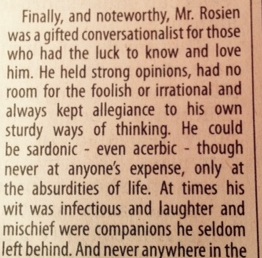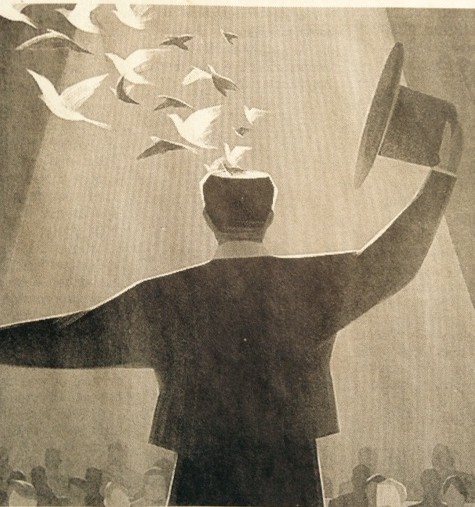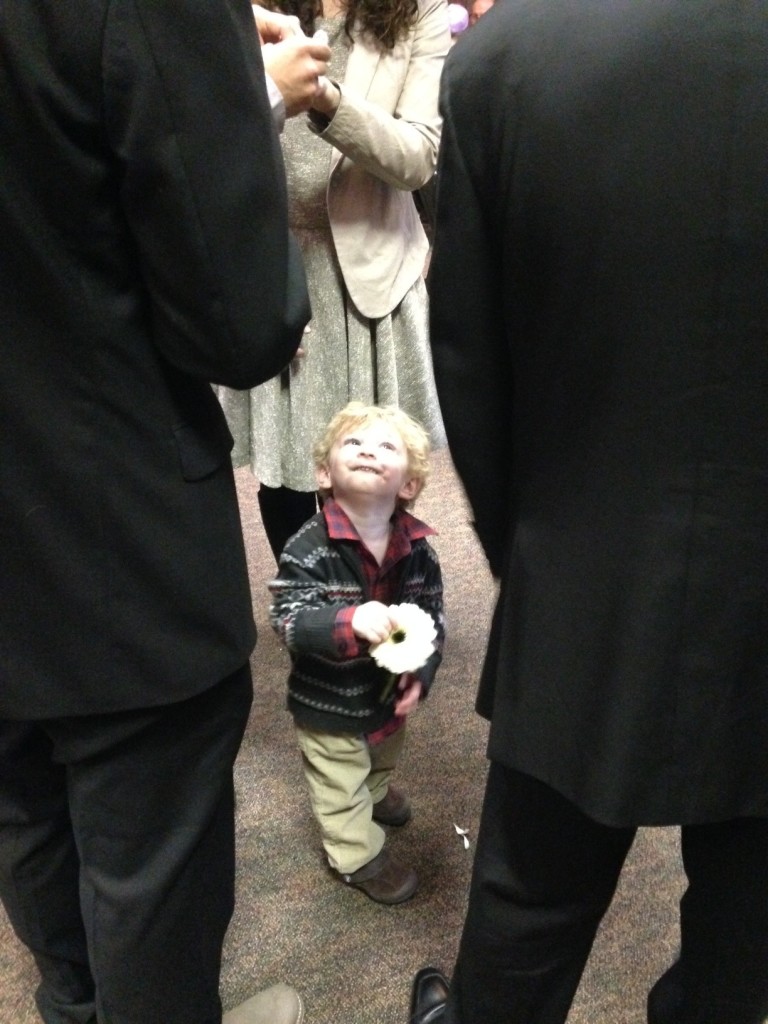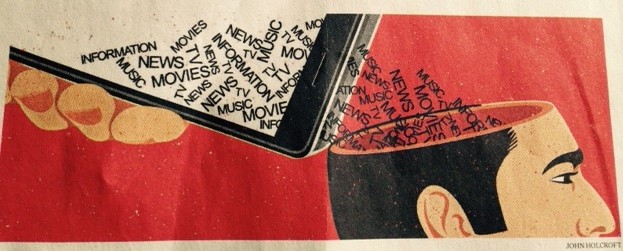to
=
Folk Journalist Sample:
I interviewed elementary school students about love http://www.scpr.org/programs/offramp/2012/02/08/22458/5th-graders-know-what-love-is-tell-commentator-han/
Folk Journalist Sample:
I interviewed elementary school students about love http://www.scpr.org/programs/offramp/2012/02/08/22458/5th-graders-know-what-love-is-tell-commentator-han/

The weight of this sad time we must obey;
Speak what we feel, not what we ought to say.
Albany in King Lear
First, know this going in: it is an impossible conversation. Or very very difficult. After a death. Words are insufficient. They just won’t work. Shakespeare may say it best. And it wasn’t just Bee Gees who sang about words being “all I have.”
Some folks first learn about death while at play. As a child in Detroit if you got caught, “counting the cars in a funeral” procession, your friends chanted that you’d be the next to die:
“The worms crawl in, the worms crawl out
The worms play pinochle on your snout
They roll you up in a long white sheet
And lay you down six feet deep…”
Verse upon verse, funnily about the scary. This goes way back to, “Ring around the rosey/pocketful of posies/Ashes ashes we all fall down,” which I’ve just learned Snopes.com claims does not come from the plague in Europe in the 1300s. http://www.snopes.com/language/literary/rosie.asp
[But another children’s choosing-up-sides rhyme, Engine Engine #9 train going off the tracks is a death trip, too, right? See GOOD HUMOR MAN entry from December 22 2015]
Worm-play on your snout works as an amulet. We injected lyrical spells into each other, arming up via curses to crack us up. Said across a circle.
Do you know any others? Perhaps there exists an Allen Lomax-curated lp collection out there — “Children’s Funeral Procession Songs of the U.S. Possibly Lifted from Great Britain.” You sure don’t see processions anymore.

When out of words dumbstruck we say someone is “at a loss” for words. Ram Dass [See DIRECTING CONVERSATION entry, February 2 2016] tries to counter this with his work with dying people in hospices. There he tries to “create a space” where someone can open up and express themselves – a space to maybe find words, continuing to play in the game of life before hanging up the skates.
“Tell me how your parents died,” she said. I couldn’t believe my ears.
“I beg your pardon?” I said.
“What good is ‘Hello’?” she said.
She had stopped me in my tracks.
“I’ve always thought it was better than nothing,” I said, “but I could be wrong.”
“What does ‘Hello’ mean?” she said.
And I said, “I had always understood it to mean ‘Hello.’”
“Well it doesn’t,” she said. “It means, ‘Don’t talk about anything important.’ It means, ‘I’m smiling but not listening, so just go away.’”
She went on to avow that she was tired of just pretending to meet people. “So sit down here,” she said, “and tell Mama how your parents died.”
“Tell Mama!” Can you beat it?
Kurt Vonnegut in his novel Bluebeard
Can you beat that? Vonnegut!
When conveying the news about a death it’s weird today because you can’t just say, “You better sit down” like they always say in the movies. Most people are already sitting, in front of their computers.
When singer Dan Fogelberg died in 2007, I went online to remember one of his tunes and I was amazed to discover scores of comments, memorial pages created at a YouTube link. Everyone mourning together via text, sending memories in video. I don’t deal well with death, but this certainly helped. Obviously it wasn’t a face-to-face mourning. But I felt I was in the middle of a new kind of moving conversation.
Back Pocket Banter: Five Ways To Convo
Do people find you comforting?
How do you comfort people?
How do you deal with loss?
Do you go on YouTube and type up your memories?
If you could live and die during any period of history, which would you choose?

Activity
Hug until the other person lets go. (Hey once we start hugging why do we ever let go? To get back to this thing the artist formerly-known as Prince calls life?)
Get into a conversation: According to many family traditions, funerals and weddings are the best times to catch up with uncles, aunts, cousins and cousins once removed. Ask about their lives and you’ll get good stories. How is that sister-in-law’s sister on the Cape and her kids at Keene State? There are Peace Corps missions and scientists and sports legends to learn about!
Family convos can remind you that funerals are to remind you that engaging in life is worthwhile and worth even more when humor, sadness, the spices of life and death—voila! —are added.
Bonus!
For conversations after funerals, actress Elaine Stritch recommended having a couple of drinks. She told me her next memoir would be called, “How Drinking Saved My Life.” In wintertime there’s Irish coffee, known for having loosened up many a tongue across the San Francisco Bay area. In summer the vodka tonic. I think I still prefer silence.
The wages of dying is love
Yes you cling
because I like you only sooner
than you will go down
the path of vanished alphabets.
Galway Kinnell
Though men and women must communicate with words,
angels can talk to one another in silence. Dante


Recently I read my 2nd cartoon strip in two days where the cartoonist drew an animal texting. In the first one, a dog texts a picture of doo doo to his owner. In the second one, a dog sniffs along using an app called, “Ipeed.”
Yes, pets are texting. Commenting on humans, of course. But have we reached the end of communication, people?
Now, I’m a fan of communication. A very big fan. (Cue NYC joke: “Are you a Giant fan?” “No, I’m an air-conditioner.”) Like most folks, I can also be incommunicado. Just not feelin’ it. You feel me? And when that happens? I seek music. Music. When nothing else works. When they’re nothing left to say.
Especially when death is closing in all around. All these rock stars 69-ing. Dying at the age of 69 or close to it. And my favorite Uncle Billy on his last legs in the suburbs of Detroit…
So I go to the movies to hear music:
Elvis Costello’s 2015 performance doc called Detour. Costello is an excellent communicator about conversation. His songs contain lyrics like,”I guess the reason we’re not talkin’/There’s so little left to say we haven’t said.”
That’s from “Good Year For The Roses.”
http://www.azlyrics.com/lyrics/elviscostello/goodyearfortheroses.html
From the same song, this one works when trying to talk about death:
“While a million thoughts go racin’ through my mind
I find I haven’t said a word”
Another great EC song is “Talking In The Dark.”
“Without you, I’m not conversational
Without the sense of the occasional
Without you, I miss talking in the dark
When the barking and the biting is through
We can talk like we’re in love or talk like we’re above it
We can talk and talk until we talk ourselves out of it”
http://www.azlyrics.com/lyrics/elviscostello/talkinginthedark.html
More recently, he wrote this:
“And every word that I have spoken is true
Except for those that were broken in two”
That’s from “Church Underground.”
http://www.azlyrics.com/lyrics/elviscostello/churchunderground.html
In Detour, ” Elvis has a gigantic TV onstage and he goes and stands inside it. Hilarious! He sounds like an old vaudeville performer only with modern lyrics. In fact, his final song? “Buddy Can You Spare a Dime?”
Music makes me feel so much better.
Because meanwhile, everybody’s 69-ing. 69 used to be about sex, now it’s about death. David Bowie and Alan Rickman, dead at 69. Dan Hicks, Maurice White, and Glenn Frey, each 74.
My Uncle Billy made it to 79. His father, my grandfather Papa John, made it to 102. Something in the math is off there. More about Uncle Billy TK soon.
Did you get all this? Any of it? What I’ve been trying to say? Yes? Then I have communicated with you. A better way perhaps — through storytelling, the way Elvis Costello does it.
Until next time,


KATHARINA: Where did you study all this goodly speech?
PETRUCHIO: It is extempore, from my mother-wit.
KATHARINA: A witty mother! witless else her son.
TAMING OF THE SHREW
Would you like to conduct better convo with your relatives?
Who wouldn’t! Conversations with a parent can be so fraught.
And here’s one reason why: Mothers make up words all the time. How do they do that? And how can you keep up with them? Either they get them brand new hot-off-the-pusses of their babies and keep a journal, or they stole them or I don’t know where they got them.
For instance, my mom always hated us kids sitting around doing nothing. “Why are you sitting around like a bump on a log? Good gravy! Criminently!”
Right there are three things at least I never understood. No wonder I was raised up so screwed up. Years before drones, heat-seeking mom missiles left me under a barrage of zingers.
Fathers are more about mixed messages. “I won’t die until I see you’re successful,” Dad would say. So wait, meaning that if I become a success, then you will die? Nooooo!
“You just gotta have that old confidence!” went another well-wrought Da-da-ism. Well, um then, how do you get that?
No idea. By contrast, mothers can lead you into the most embarrassing conversations ever.
THE TYPING TEST
During one of our best, I was smack in the middle of a typing test in New York City, in the kind of yellowing midtown employment office where 80 wpm w/14 mistakes is kinda lousy, but in the late 1980s could still get me “temp work.”
I grabbed an empty desk and gave a call back to Detroit while waiting for the woman doing the scoring to return.
“A typing test?” Mom asked right away.
“Yeah, I know,” I said, affecting dullness, my go-to affect when feeling attacked. “A typing test. I’m 35. At 35 a typing test.”
“Did you tell them you were a writer?”
“Yes, I said to the lady: ‘I should be writing the copy for this. This Royal Typing test? Not taking it, but writing it, ha ha.’”
“I just read an article —“
[I cut this part for many reasons. Moving now to later in our conversation.]
“You sound depressed.”
“Well, it’s just that, I’m already at the age pro football players retire.”
“So? You’re not married, you don’t have another mouth to feed.”
“I know. I mean I should be, but I’m not. Well at least I’m not divorced yet.”
“You’re still seeing Michelle?”
“Yes, I told her last night: I’m 35, I should be getting my kids to bed. Instead I’m still trying to get you to bed. But no, we’re not going together…no.”
“And the other one?”
“Her?”
“If that’s the one. I don’t know.”
“The other one took me to a dance concert. Well, it began as dance and then came a light show and there was some singing and a film.”
“Whaaaaa?”
“One of those new wave variety deals. But one of the dancers had a broken leg, and the singer had laryngitis, so the dancer had to sing and the singer had to dance.”
“Oy fa voy.”
“It was okay. The film was good.”
“Now what about Melissa?”
“No, we’re not, no.”
“You’re not seeing her anymore?”
“No. Because her life is a mess right now, she says. I said what woman’s life isn’t a mess right now. With everything that’s going on.”
“Wasn’t there another woman visiting from Boston?”
“Her? No, we’re not, no. She told me she’s been having some bad luck with her Ouija Board lately.”
“You don’t say!”
“Or something. She’s been seeing this mystifying oracle, I don’t know, it’s none of my business. I said, ‘Who has time for two-minute mysteries, baby: love me.’”
“You remember what I told you?”
“That moose meat rivals the best beef?”
“What?”
“I know – love is just peer pressure when you really need it the most.”
“Your father and I would like to see you…you know.”
“Sure I wanna be married; it would improve my social life! That’s like asking why do I trample on the environment? Because-the-guy-before-me-did! That’s why anyone gets married.”
“Well, your father and I –”
“No, I do. I wanna make my kids laugh. I want them to make me laugh.”
“So?”
“So everybody I know is either getting married, breaking up, having a baby, or dying.”
“Welcome to my world, that’s called being an adult.”
“Thank you! I wondered what that was supposed to feel like.”
“And wasn’t there one from last summer?”
“Her? No, we’re not, no.”
“Mindy?”
“I mean, we were, but now we’re not.”
“Not even seeing each other?”
“But that’s the great thing about voice mail: you don’t wanna see each other but you can pretend to still be talking. She leaves voicemails she says, just to put her voice into my energy field. ”
“Go on!”
“It’s like getting messages from another dimension.”
“Better than a poke in the eye from a sharp stick.”
“The last time with her she said she had to laugh to keep from throwing up.”
“Go on!”
“Remember the one who told me that before I met her I could barely butter bread?”
“No.”
“She told me for a guy who claimed to have his head in the game, I sure had it up my ass half the time.”
“The therapist?”
“Like, I couldn’t even look at her anymore without feeling I was sexually harassing her. So no, we’re not, no.”
“So go no.”
“So now you know.”
“Good gravy. Well, thanks for calling. You could call more often.”
“I’ve been trying to. You’re never home. Get your answering machine fixed, we’ll talk. Bye Mom – ”
[CLICK]
Decent convo but I get no closure because my mother just hangs up. She got that from her father, a member of Generation I from a time when a phone call wasn’t anything like a real conversation consisting of greetings and farewells. A phone call back then was an event! Witness this 1904 scene from the MGM musical, MEET ME IN ST. LOUIS *
Years before “Let the machine get it.” Before phone conversations became interruptions because a call bothers you in the middle of everything going on right then in your life. (Mostly texting.)
Five Questions For Folk Journalists
Do you have conversations with family members face-to-face?
How long do these exchanges last?
What would improve your conversations?
At what age did you have your best conversations with a parent?
Did your father or mother have any “catch phrases” passed on to your siblings?
Activity
Want more fun connection with beloved family members? Try some phrases/trite truisms a parent particularly pulled out for no rhyme and very little reason. (References from the ’50s and ’60s are all fair use, public domain and publically-domiciled cultural fodder.)
“Hey, there she is, the People’s Choice!”*
“Hello Old Timer!”
“Good Gravy!”
“It’s all grist for the mill.”
“Christ on a bicycle!”
Bonus! Another Excellent Mom Convo
Seattle Seahawks quarterback Russell Wilson recalled a childhood conversation with his mother. She wanted him to understand that becoming a world-class athlete was not as far-fetched as he thought. She said Russell should ask himself: “Why not me?”
* In MEET ME IN ST. LOUIS, starring Judy Garland and written by Irving Brecher and Fred Finkelhoffe, a phone call took an appointment to arrange. And a family to listen in.
There’s less cleaning up afterwards.
Kurt Vonnegut on why he preferred laughing to crying.

I long
To hear the story of your life, which must
Take the ear strangely.
Alonso to Prospero in Shakespeare’s The Tempest
Seeking an enlightening conversation?
Talk to the deaf.
Take my niece Liz, who works at Gallaudet University in Washington D.C.* Recently, she taught me that speaking in ASL – American Sign Language— can bring forth better conversations onto this earth. How do the deaf do it? And do they do it better?
“Well not necessarily better,” Liz explains, “but it’s a different way of conversing.”
But don’t the deaf miss mucho el converso when they don’t hear any of it?
For the following conversation, we aren’t using ASL; Liz reads my lips and I understand her speech, being in the same family for 30 years…
HANK: How different is this conversation?
LIZ: While I talk, you are hearing everything going on around us. 360 degrees. While you talk, deaf folks listen by looking. I can’t look away.
HANK: How about when two deaf conversationalists use ASL to communicate?
LIZ: The person who signs doesn’t have to look directly when conversing. But the person paying attention has to look at the signer to understand. This is a more direct and more effective way to communicate.
HANK: More direct. Why do you think so?
LIZ: Because it takes more of an attention span to look the whole time. Deaf speakers are more comfortable with eye contact.
HANK: Sometimes it is too much for me to look so long into someone’s eyes.
LIZ: I know! Hearing people get like, “Stop staring at me!”
[Laughter]
HANK: The deaf don’t stare?
LIZ: They’re paying attention. They convey information by the way they look at each other, with facial expressions.
HANK: Your convo has more info because of facial expressions?
LIZ: A hearing person can use the inflection of their voice to convey certain emotions –excitement, sadness, fear. A deaf person on the other hand – I have to tell you visually: I AM SO ANNOYED! Or just pissed off.
HE: It’s much more in your face.
LIZ: Yes. Another thing is, sometimes with a hearing person who is dull, the words come out all – the – same.
HANK: So the deaf are really the most un-robot-like of all conversationalists.
LIZ: I don’t know about that….
Awkward And Semi-awkward Silences
HANK: What about silence? Are deaf folks more comfortable with them?
LIZ: No, we’re the same. There’s no difference.
[Silence]
HANK: What other differences are there?
LIZ: Deaf culture is much more information-centered.
HANK: Give me an example.
LIZ: A hearing friend says: “Look over there.” But “over there” means what?
HANK: Look there?
LIZ: “Look, look!” they’ll say. But that’s not specific enough. And I’ll say, “That’s not helping me. What is over there? A bird, the sky?”
HANK: Superman?
[Laughter]
LIZ: Deaf speakers offer more information: “Look at that tree, how red the leaves are. Look.” We’re used to a more direct way of explaining things. Sometimes with a hearing person, things get so vague.
HANK: Deaf conversation is fuller in a way?
LIZ: Well, I miss the nuanced clues. I can see what’s going on, but you know more than I do. You have the information about the red bird: Please explain more to me!
HANK: What about talking in a group of people? Like at a meeting or a party?
LIZ: In most groups, there is “turn taking.” Talkers take turns while others listen. A deaf conversation has much more turn taking. It is a requirement, because you can’t all be signing at the same time; everybody will get lost. When one person talks, everyone looks at that person. That’s how it works.
Tips For The ASL-impaired Conversationalist
HANK: What else can I learn about conversing?
LIZ: Slow down. Exercise your facial expressions. Move your hands and don’t be afraid to point things out.
HANK: Sign language seems such a wonderful way to conversate.
LIZ: I don’t know that word “conversate,” but ASL can be taught right from birth. It is a part of the connection between parent and child. Babies want to communicate. They can be taught the sign for “milk” which is the baby squeezing their hand. So this is before they ever say in English, “I want milk.”
HANK: I love that!
LIZ: And look, it can serve you your whole life. Think of this: if you are across a room, you don’t have to scream. You can just sign!
* * *
QUESTIONS
With blind folks, everyone seems to want to help. But with deaf people, are hearing people scared to even speak? Is there a fear of the deaf?
As early adopters of technology — from Blackberry to Sidekick to FaceTime, Skype, etc — what’s next? Liz suggests: Virtual interpreters, avatars there anytime you need translation, some kind of captioning on your eyeglasses so you can understand in real time whatever information is coming your way.
So what do you see coming after that? Liz answers: “Beam me up!”
ACTIVITY
Be more visual by using facial expression.
Provide more context when pointing something out, get more comfortable with your hands.
Don’t be afraid to point.
Maintain eye contact.
Slow down.
And if you are still struggling to communicate?
My niece suggests: Relax.
“I’m shy too,” Liz says. “Remember that nothing is perfect and it’s okay to ask questions. It’s really okay to say: I did not get that. Can you say it again? It’s a drag when someone goes yeah yeah yeah and I know they aren’t getting it. I wanna slap them in the face.”
Between now and now, between I am and you are, the word bridge. Entering it you enter yourself: the world connects and closes like a ring. From one bank to another, there is always a body stretched: a rainbow. I’ll sleep beneath its arches.
Octavio Paz, The Bridge
Thought is free.
The Tempest
Have compassion for everyone you meet,
even if they don’t want it. What seems conceit,
bad manners, or cynicism is always a sign
of things no ears have heard, no eyes have seen.
You do not know what wars are going on
down there where the spirit meets the bone.
Miller Williams
http://www.nytimes.com/2015/01/03/arts/miller-williams-laconic-arkansas-poet-dies-at-84.html?_r=0
http://www.arktimes.com/RockCandy/archives/2015/01/02/rip-miller-williams-1930-2015
*Gallaudet University: https://www.gallaudet.edu/about-gallaudet.html

Gone are the days when you had to ask a perfect stranger to take your photograph.
Advertisement in Lufthansa Airlines magazine
Gosh, wouldn’t want to actually speak to a foreigner would one? Avoid talking to them altogether, right?
Yoiks!
But if you seek to deepen your experience and learn more about what it’s like to live in a part of this planet you don’t know, try these:
(Know this: folks may even invite you home to really show and tell the answers!)
“What is your greeting and goodbye here? I would love to try saying it.”
“If we only had one day here where would you take me?”
“If you only had one day in my town, what would you like to see?”
“What do you dislike about your countrymen and women?”
“What do you dislike most about Americans?”
“What is the word for funny bone here? (I’m collecting them from every language and culture I contact.)
“What’s a big difference between here and American culture?”
“What do you think we don’t we get about you?”
So who asks questions like this?
Folk journalists, that’s who. The key? Model the practitioners of extreme curiosity who play upon their fellow Americans. Steve Allen and Mal Sharpe, originally radio guys with a microphone who moved to television, were known on their broadcast logs as “MOS” – Man on the Street. And if you have no gift for the small talk, you’re not alone. Still, everyone is trying, dying for conversation. Oddball worldviews (see Steve Allen, Mal Sharpe*) can not only draw everyone into conversation — hey they can even improve your outlook on life.
FIVE WITTY BANTERINGS: Things To Say When You’ve Got Nothing
“I read that elephants carry on various kinds of conversation.” This practice is known as referring to something you saw on PBS. In other words, a surefire method of directing your convo to television. Here you and your partner can get lost for hours. “They dance, too! They showed elephants doing an end zone dance to celebrate a group activity. Amazing huh?”
“I got a new scammer – I mean scanner.” This practice is known as: saying things that you heard wrong and then correcting yourself once you’ve gotten attention. Another example of this is: “Do you smell a smunk?”or “Man, you got a one-hack mind.”
If reaching out to bother someone seems like too much work and you really want to chillax like a pal, try sprinkling yon saucy sentences with the likes of: “It’s so funny, the things you remember.”(FILL IN OWN MEMORY HERE)
“’Tell the truth. But tell it slant.’ Dorothy Parker said that.” (Yes, it is cool to have a Dorothy Parker quote at the ready.)
* LINK to Man on the Street’s Mal Sharpe: http://www.coyleandsharpe.com
Talking about how tired and stressed you are from work is reprehensible and not an acceptable form of conversation.
Mindy Kaling